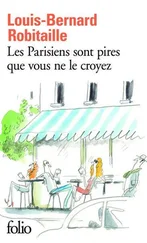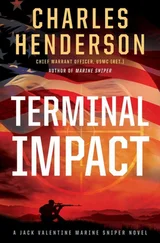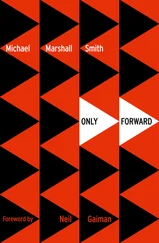He stopped dead in his tracks and turned around.
She was across the street. It had begun to not so much rain as mist upward, the slishing traffic making a kind of street-level fog that he immediately worried was she cold in. He actually reached toward her, the very gesture that set her off on a dead sprint as it might a doe. He chased her up the block on the opposite side of the street, yelling her name, shouting for her to just wait, he just wanted to talk, pleading and running and thwarted by the cars from crossing. He shot into the halted traffic at a stoplight and screamed when he couldn’t see her. He scanned the shop windows, and ran two blocks at a dead sprint and then into an evening throng leaving work, and onto the street when the sidewalk clogged. He didn’t see her. He clambered into a parked pickup bed and then onto the roof. Next to him a horn blared and did not puncture his panic. It was only when Luke yelled his name that he came somewhat to his senses and leapt down and into the car.
“Did you see her?”
“Rachel?! Is that what you—?”
“Drive! Go!”
Luke put the car in gear and Pete scanned the sidewalks. All too soon they came to a halt just before the freeway. Red brake lights blurred and spangled through the windshield.
“Wipers! I can’t see!”
Luke fumbled with them, and Pete reached over to do it himself and with the first pass spotted his daughter striding to the corner, glancing from time to time over her shoulder. He jumped out of the car.
“Pete, wait,” Luke said, but Pete slammed the door and started for her.
He’d have to grab her. Sneak up and just grab her.
He slunk behind the idling cars, startling not a few of their inhabitants with his skulking. When the light changed, he had to get out of traffic and for a moment the noise of it disguised his coming up behind her. Her hair hung in loose curls, wet against the back of a thin jacket. She had a small drawstring backpack of moist canvas. Low-top sneakers. No socks. She hugged herself at the crosswalk, and then turned full around to see him, what was he saying was he saying anything she just ran into the traffic, the on-ramp, cars skidding, and he went headlong after her. She scampered up the grassy incline and he slipped in the steps she made so effortlessly, he clawed at the earth hand and foot and when he reached the highway she was running along it and he after and she looked back to see was he coming and when she saw he was, she ran into the highway and down the median between the cars. He thought he’d seen her killed, heedless semis slicing past her, but he drew even of her and still she ran, she didn’t look over and he dared not cross over to her for fear a car a truck a van would, in swerving to avoid a man, run his daughter down. He waved at the traffic to stop but they only saw a hysteric and maybe the girl in the mist. She darted to the concrete divider between the northbound and southbound lanes and she stopped a moment to catch her breath or to see was he coming and he held up his hand as though to say I’m not coming, I give up, I won’t chase you just stay there a minute but she leapt over the divider and ran into traffic again and his heart dropped and the only way he knew she made it was by a smear of her going over the guardrail on the other side of the highway.
In the motel, they made plans to search the city together, Pete in a kind of stupor, watching the news, not really watching the news. The next day, they drove all over Seattle, Luke drinking coffee, saying that she’d turn up, he was sure.
Everything observed through rain. They watched it fall in ribbons of streetwater from underpasses and from the broken gutters of abandoned apartment buildings. They watched it fall on a popular place in Belltown where homeless kids came and went, bartered, and otherwise idled away the days. No sign of her. Just the low hum of sleeplessness behind the eyes. Of worry. Pete wondered could a person drown in it, as in a ceaseless rain, a flood.
A squad car eased up alongside them. Luke gripped the wheel as the officer interrogated them, asking flat out were the two of them here to score some pussy or some dope. Or some dick. He didn’t even ask for their IDs, just ordered them to move on.
Luke lost his nerve, speculated and then was certain that the cop had remembered his mug shot after he told them to go, that there was now an APB out for him. He backed into the parking spaces for a faster getaway, certain it would come to that. Walking along the pier, he hunched his shoulders, folded up his collar, tugged his cap low, utterly spooked.
Pete didn’t notice any of this. He couldn’t stop thinking of Rachel running from him. How he just about got her killed.
“I can’t be out here,” Luke said, his head swiveling around like they were being tailed.
Pete couldn’t evict that scene from his head — those trucks and cars, her lithe body in the wet traffic. Everything was soaked and shining and hard. Except her. You were killing her, chasing her like that. You were as much as killing her. If you found her up here, she’d jump off the pier, swim to the middle of the Pacific—
“Pete. Wait.”
Pete halted, but not because Luke told him to.
“Jesus, there’s cops all over, Pete.”
There were. All of them headed to the water, edging through the crowd lined up along the railing, looking over, pointing at something in the water. Someone in the water.
It was like he’d willed it to happen. Like she’d sensed him.
“I gotta get out of here,” Luke said.
But Pete ran to the throng and pushed through it to the railing and looked over. Thirty, forty feet below. He was sure it was her in there, bobbing akimbo facedown in the greenblack swells knocking gently against the great log pillars but it wasn’t, the girl was too tall, too tall and even in the dark water so blond and so utterly dead. Rachel was not tall. Not so blond. Not dead.
Luke was waiting for him at the car.
“Pete, I can’t—”
“Me neither,” he said. “I’ll take you home.”
He meant to go home too but found himself in Belltown again at the abandoned apartment. It had been freshly boarded up by the owner or the city and had no ingress. He circled it until he discovered the fire escape. The metal teetered away from the wall in places where it was poorly or no longer affixed to the brick and mortar, but it held him, and on the third flight, he pushed in the padlocked door. A narrow trash-filled hall. A gray light leaked in from foggy skylights. Seepage stained the walls.
After several rooms, he thought he found it. How did he know. There was a mattress and a pair of skates, a notebook, a bag of makeup and cheap jewelry. A duffel held skirts and girls’ underwear. A sock-monkey doll and a pack of cigarettes and within it, a small Baggie of marijuana dust.
He opened the notebook. He took it to be her handwriting but wasn’t sure. What time this girl rose and the weather that met her. How hard it was to write at all. Her sincere intention to keep her thoughts in here but how when it came time to write she didn’t have anything to say or so much to say that she didn’t know where to begin and how she couldn’t stay put long enough to express it in any case.
An entry about how she left P+Y and she would have to write more about that later, she was too happy to write about sad stuff and bum herself out.
A list of thing she needs to do. Stop chewing her nails. Find a job. Find a place. Try to sleep at least eight hours. Get up early. No arguments.
An inexplicable gratitude swells. The floor pulls away from your crossed legs, but it’s just a light-headedness. Of late you’ve been through so much. More than can be borne. You’d seen a man die. You’d learned your daughter was a prostitute. And as the weak sunlight went darker yet in advance of another rainstorm, you find yourself in the midst of a strange peace that seems to emanate from the middle of your chest, a warm spot that reminds you, to your mild amusement, of peeing in a pool or wetting the bed or wetting the diaper and finally, of course, of being in your mother’s womb. Even the thought of your mother and father buried in the ground doesn’t trouble the serenity that now strobes in the atmosphere around you.
Читать дальше












